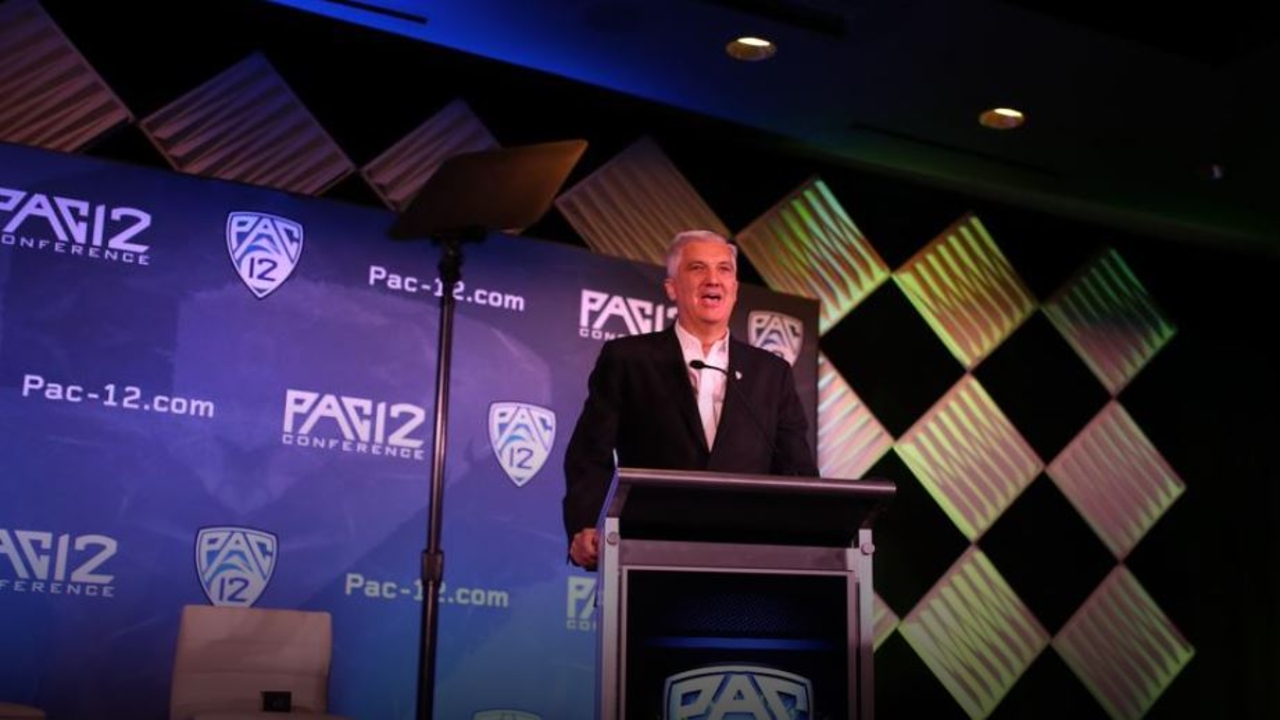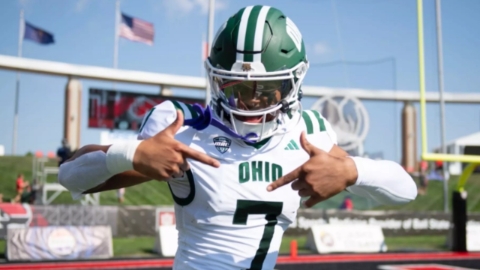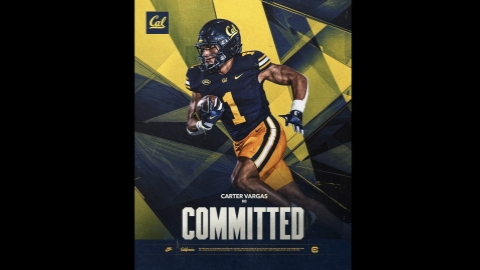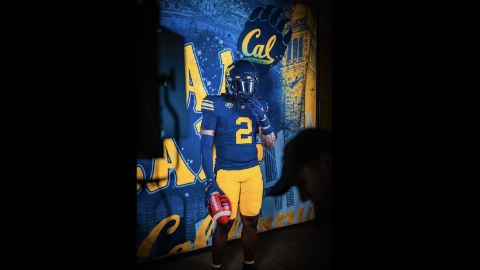LOS ANGELES, CA -Little did he know that just a year after assuming the role of Pac-12 commissioner, second year commissioner George Kliavkoff would find himself in the middle of a firestorm unlike any the conference had seen in years, if ever.
With a month of rumors, innuendo and more, Kliavkoff took the stage with assistant commissioner Merton Hanks and Stanford athletic director Bernard Muir to address the current state of the conference and field questions from conference media.
“Just over one year ago I joined the Pac-12 as commissioner because I believe strongly in the Pac-12's mission to develop the next generation of leaders by championing excellence in academics, athletics and the well-being of our student-athletes,” said Kliavkoff.
“While college sports are undergoing unprecedented transformation, that mission has not changed and will never change for the Pac-12.
“Since the Pac-12 was formed, we've been a leader in supporting student-athletes. I'll give you a few examples. We were the first conference to include student-athletes in our formal governing structure. We provide leadership around student-athlete care, both in mental health support and guaranteeing post-competition injury care for four years, twice as long as our peer conferences.
“We guarantee financial support for degree completion. We have always led in the areas of diversity, equity, inclusion and social justice initiatives. We fought for student-athlete time demand legislation to ensure the primacy of academics.
“However, when I look at what is taking place in college sports, I believe that we have collectively lost sight of the student-athlete. We need to recalibrate our approach to ensure our filter for any decision is what is in their best interest.
“The good news is I believe that there is a path forward that will allow us to stay true to our mission and support our student-athletes while also adjusting to the reality of today's changing landscape.
“So my message today is one of optimism both for the future of the Pac-12 and for our industry.”
The commissioner also touted the historical success of the conference, though it will be significantly diluted with the departure of USC and UCLA.
“Beyond football I'd like to acknowledge the success of our student-athletes across all sports,” said Kliavkoff. “Last year the Pac-12 won seven NCAA championships, tied for the most in the nation, and marking the 17th straight year that the Pac-12, the Conference of Champions, has led our tied for the most NCAA championships.
“This year the 50th anniversary of Title IX also saw the Pac-12 win its 200th women's championship, an incredible milestone and far more than any other conference, a testament to our schools' commitment to women's sports.”
The commissioner then addressed the elephant in the room -the impeding departures of bellcow conference programs USC and UCLA.
“As a conference, we are of course very disappointed by the decisions by USC and UCLA to leave the Pac-12 and a century of tradition and rivalries after 2024,” said the commissioner. “That said, USC and UCLA have been proud members of the Pac-12 for almost a century. Despite their decision, we cherish our relationship with their student-athletes, coaches, staff, faculty, alumni and fans.
“For that reason I personally have instructed everyone at our conference to make sure that USC and UCLA student-athletes are given every opportunity to compete and succeed for as long as they remain in the Pac-12.
“Moving ahead we are bullish about the Pac-12's future and our opportunities for long-term growth, stability and success. Our conference boasts 10 of the most iconic and innovative brands in all of sports, all-around excellence in academics and athletics, and a half dozen of the most valuable markets in this country.
“Over the past four weeks, we have been directed by our board to focus the work related to the future of the conference into three work streams. First, we will continue the work we had already started last year to enhance the value of our media rights. This work includes the creation of new made-for-television events, elevating our non-conference competition, and adding new revenue streams.
“Examples of this work include our decision to start the Pac-12 baseball and softball championships, changing the NCAA rule to elevate the media value of our football championship game, and being the first Power Five conference to sell rights to our data.
“All this work will benefit our student-athletes' ability to continue to compete at the highest level of college athletics.”
The commissioner next addressed a subject at the forefront of the league’s ability to move forward as a viable unit -media rights.
“We have initiated our media rights negotiations,” said Kliavkoff. “We are in the enviable position of being next to market after the Big Ten. We already have significant interest from potential partners including both incumbents and new traditional television and most importantly digital media partners. This interest is driven by the strength of our schools' brands and markets and a recognition of our continued leadership position in college football across the Western and Mountain time zones. With the value of premium college sports rights continuing to rise, multiple interested media partners and limited opportunities, particularly in the west, we are confident in the long-term value of our rights.
“To set expectations, this process will accelerate after the Big Ten deals are concluded and will likely take months to complete. Even with the loss of our two L.A. schools, we still believe that after the current cycle of media rights deals, we will be very well positioned among the Power Five from a revenue-per-school standpoint.
“This is critical to ensure our athletic departments have the resources necessary to continue to compete for national championships, attract the best coaches, and support the health and well-being of our student-athletes.
“Third, we are actively exploring expansion opportunities. As we consider these opportunities, we will look at media value, athletic strength, academic and cultural fit, and geography from a recruiting and student-athlete experience standpoint.
“As you would expect, we've had significant inbound interest and are in the process of evaluating opportunities.”
Kliavkoff next addressed another critical element programs around the conference and the country are doing their best to navigate.
“Let me turn to two important issues facing college athletics and suggest some potential solutions,” said the commissioner.
“First with respect to name, image and likeness, I believe it is time for the 10 FBS conferences to step in and agree to NIL legislation and a strong, effective and expeditious enforcement mechanism. All 10 conferences are strongly in favor of student-athletes being able to benefit from their NIL.
“But we also need three simple and obvious guardrails: NIL should not be used as an inducement. NIL should not be used as pay-for-play. And the amount earned as NIL payments should be commiserate what the NIL provided and not a veiled inducement or pay-for-play.
“These are current NCAA rules that the NCAA has unfortunately chosen not to enforce in the wake of the Supreme Court decision in Alston. Recodifying and enforcing these three simple NIL rules will protect our student-athletes while still allowing them to earn.
“Second, it's time for us to consider steps we can take to fairly recognize our student-athletes' contributions and more appropriately allocate the resources created through athletics without fundamentally changing the role of our educational institutions.
“While I do not believe that our student-athletes should be treated as employees, we must recognize and meaningfully address the extraordinary ways in which they contribute to our athletic programs, campuses and communities.
“One solution might be to consider whether to expand or remove the remaining caps on academic awards. Whatever solutions are considered, there are many reasons why treating student-athletes as employees would be detrimental.
“There could be a draft system, and athletes would lose the choice of which school to attend. They could lose their ability to transfer between schools. In fact, professional athletes are typically subject to trades or being fired for poor performance. It's hard to imagine that professional athletes would be required or even allowed to attend school to earn degrees.
“I am also concerned about what happens to our broad-based athletic offerings when a school's athletic department becomes so dramatically altered that its primary interests are tied to professional sports and not education.
“We are committed to finding an appropriate solution, and I believe the time to start engaging in these conversations with our student-athletes has arrived.
“Taking a step back, looking more broadly at the state of college athletics, it is clear that financial considerations have become the primary driver for many recent decisions in college sports. There is already a lot of money in college athletics. With the new media deals, the expansion of the College Football Playoff, there will soon be significantly more to go around.
“Increased revenue can help us support our student-athletes, but a singular focus on money will certainly cause more harm than good.
“College athletics has a unique structure where conferences and schools compete against each other for resources to support their individual student-athletes, but the long-term viability of the enterprise relies on schools and many conferences being healthy and able to compete.
“Our long-term measure for the success of college athletics cannot be how much money we consolidate into ten or five or two conferences, but rather should be our ability to support the largest number of student-athletes while still facilitating competition between schools and conferences.
“We should be measuring how many lives we can change by providing scholarships to students that otherwise would not attend college. We should be measuring total financial aid and our ability to provide the highest level of athletic competition to our student-athletes without unnecessary travel, time demands and other burdens on competition impeding their academic success.
“We should be measuring our ability to provide competition in a manner that does not harm our student-athletes' physical and mental health.
“We are at a critical juncture and the decisions we make in the near future will determine whether we head towards a world in which a small handful of conferences are playing professional sports at the expense of tens of thousands of academic opportunities, or we use the bounty of resources available to continue to develop future leaders through sport and to expand financial aid opportunities to more and more student-athletes.
“Despite all the challenges facing college athletics, I remain confident in our collective mission to develop the next generation of leaders, and I remain confident in the Pac-12.”
Kliavkoff and Mure were asked about how the Pac-12 and other conferences can effectively regulate NIL without inviting anti-trust lawsuits.
“Well, anti-trust is the reason why the current NCAA rules are not being enforced,” said the commissioner. “The risk of anti-trust diminishes when you have a smaller number of conferences, smaller number of schools instituting rules and enforcing those rules. That's why I'm calling for the 10 CFP conferences -- the 10 FBS conferences to focus our attention as opposed to waiting for the NCAA.”
I would agree with that,” added Muir. “I think it's important that we have some level of enforcement. Certainly we're seeing that in the recruiting realm where schools and I should say boosters and friends of the institution are getting involved when they shouldn't be. That's not the essence of this.
We are in favor of student-athletes earning revenue from their name, image and likeness.
“The clear line for me should be that boosters should not be able to interact with high school students before they've committed,” noted Kliavkoff. “Coaches should be able to say to a recruit that historically kids who have come here and played that position at that level have enjoyed this kind of NIL. But you can't negotiate the NIL before the kid has committed. That would be a good bright-line rule that I think would be easier to implement.
Kliavkoff was also asked about the likelihood of the 10 remaining programs staying put in the conference.
“We've had two board meetings a week for the last four weeks. Looking my colleagues in the eye, understanding their commitment, that their first priority is making sure that the Pac-12 survives, thrives and grows and is successful.
“They're committed to the conference. I think the best thing to do is to ask them about it.
“With respect to the Big 12 being open for business, I appreciate that. We haven't decided if we're going shopping there or not yet.”
Kliavkoff also noted that joining or merging with the Mountain West was not one of the options the conference is considering.
The commissioner was also asked about the attempted poaching he’s had to help fend off by the Big 12, who has attempted to sieze on the conference’s current perceived vulnerability by luring several programs to their conference.
“I've been spending four weeks trying to defend against grenades that have been lobbed in from every corner of the Big 12 trying to destabilize our remaining conference,” said Kliavkoff.
“I understand why they're doing it, when you look the relative media value between the two conferences. I get it, I get why they're scared, why they're trying to destabilize it. I was just tired of that. That's probably not the most collegial thing I've ever said.”
Kliavkoff was also asked about more specifics about how the conference’s media rights might be structured with the next contract.
“Without talking about individual potential partners, I would say it's highly likely that we will end up with a big digital partner for some of our rights and that our rights will be distributed in a way that's unique, different and new. We're excited about that,” said the commissioner.
As for what the conference is looking for an potential new conference members?
“Start with market, the media value,” said the commissioner. “Go to the athletic value, whether or not they would contribute to the Conference of Champions. Academic and culture fit is part of it. Then we're very focused, I think uniquely, in thinking about the effect of student-athletes when we add schools. We think about travel and about what we're going to put our student-athletes through if we expand geographically too far away.
“I'm proud of the fact that's part of our criteria.
“Listen, we understand how important revenue is. We understand that for the last 10 years, because of a series of decisions that were made by the conference 10 years ago, we're behind. We have to close the gap in revenue. That's going to be a focus.
“But as we think about adding schools, one of the criteria will be cultural, academic fit. It's really important to our presidents and chancellors who make these decisions at the end of the day.”
“I would agree,” said Muir. “What I've seen recently, as George has mentioned, we've been on numerous calls with our presidents and chancellors, this is important to them, and likewise it's important to athletic directors to execute on that plan.
“I assume there will be many more discussions to come, but that would be a high priority as we evaluate the future.”
Q. Bernard, have you had any discussions with the Big Ten or any other conference?
BERNARD MUIR: We have not. I will say in our meeting yesterday with my fellow peers around the conference, we have been really open and transparent. We understand the issues at hand.
“When this broke a month ago, we all, each one of us, are trying to figure out scenario planning. We have discussions internally and try to figure that out. But we have had not had any formal overture from another conference.”
When he was asked about the potential for UCLA abandoning their proposed move to the Big Ten after pressure, the commissioner pulled no punches when it came to where UCLA is at when it comes to the backlash they’re currently facing as a UC program who made a unilateral decision to change conferences without fully consulting the governor -who is also the head of UC- or the full body of regents.
“I'd say UCLA is in a really difficult position,” said Kliavkoff. “There are a lot of constituents related to UCLA who are very, very, very unhappy with the decision. Student-athletes, the families of student-athletes. The faculty, the staff. The politicians, the fans, the alumni. There's a lot of really, really upset people with that decision.
“There's a hearing coming up about that decision.
“I can't give you a percentage chance. I think it's unlikely. But if they came back, we'd welcome them back.”
Stay tuned for more from today’s Pac-12 Football Media Day.




